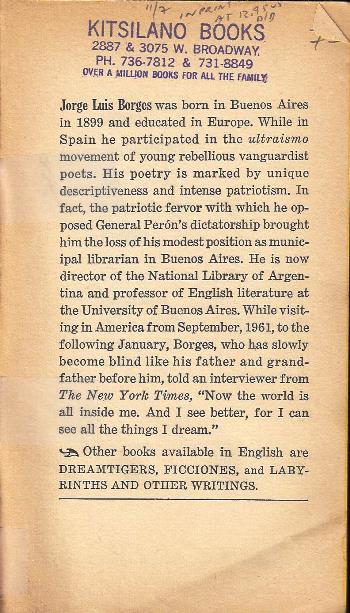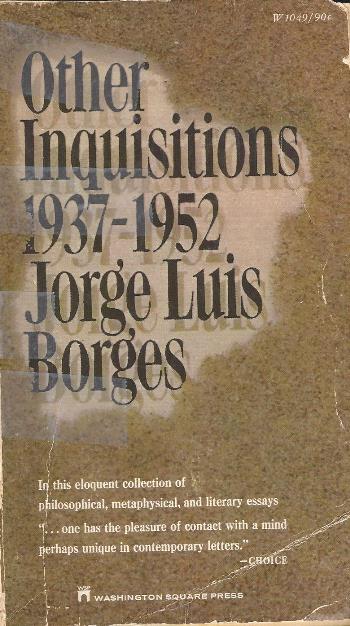

A Comment on
August 23, 1944
That crowded
day gave me three heterogeneous surprises: the physical
happiness I experienced when they
told me that Paris had been liberated; the discovery that a collective
emotion
can be noble; the enigmatic and obvious enthusiasm of many who were
supporters of
Hitler. I know that if I question that enthusiasm I may easily resemble
those
futile hydrographers who asked why a single ruby was enough to arrest
the
course of a river; many will accuse me of trying to explain a
chimerical
occurrence. Still, that was what happened and thousands of persons in
Buenos
Aires can bear witness to it.
From the
beginning, I knew that it was useless to ask the people themselves.
They are
changeable; through their practice of incoherence they have lost every
notion that
incoherence should be justified: they venerate the German race, but
they abhor
"Saxon" America; they condemn the articles of Versailles, but they
applaud the marvels of the Blitzkrieg; they are anti-Semitic, but they
profess
a religion of Hebrew origin; they laud sub-marine warfare, but they
vigorously
condemn acts of piracy by the British; they denounce imperialism, but
they
vindicate and promulgate the theory of Lebensraum;
they idolize San Martin, but they regard the independence of America as
a
mistake; they apply the canon of Jesus to the acts of England, but the
canon of
Zarathustra to those of Germany.
I also
reflected that every other uncertainty was preferable to the
uncertainty of a
dialogue with those siblings of chaos, who are exonerated from honor
and piety
by the infinite repetition of the interesting formula I am
Argentine. And further, did Freud not reason and Walt Whitman
not foresee that men have very little knowledge about the real motives
for
their conduct? Perhaps, I said to myself, the magic of the symbols Paris and liberation is so powerful that
Hitler's partisans have forgotten
that these symbols mean a defeat of his forces. Wearily, I chose to
imagine
that fickleness and fear and simple adherence to reality were the
probable
explanations of the problem.
Several nights later a book and a memory
enlightened me. The book was Shaw's Man
and Superman; the passage in question is the one about John
Tanner's metaphysical
dream, where it is stated that the horror of Hell is its unreality.
That
doctrine can be compared with the doctrine of another Irishman,
Johannes Scotus
Erigena, who denied the substantive existence of sin and evil and
declared that
all creatures, including the Devil, will return to God. The memory was
of the
day that is the exact and detested opposite of August 23, 1944: June
14, 1940.
A certain Germanophile, whose name I do not wish to remember, came to
my house
that day. Standing in the doorway, he announced the dreadful news: the
Nazi
armies had occupied Paris. I felt a mixture of sadness, disgust,
malaise. And
then it occurred to me that his insolent joy did not explain the
stentorian
voice or the abrupt proclamation. He added that the German troops would
soon be
in London. Any opposition was useless, nothing could prevent their
victory.
That was when I knew that he too was terrified.
I do not
know whether the facts I have related require elucidation. I believe I
can
interpret them like this: for Europeans and Americans, one order-and
only one is
possible: it used to be called Rome and now it is called Western
Culture. To be
a Nazi (to play the game of energetic barbarism, to play at being a
Viking, a
Tartar, a sixteenth-century conquistador, a Gaucho, a redskin) is,
after all, a
mental and moral impossibility. Nazism
suffers from unreality, like Erigena's hells. It is uninhabitable; men
can only
die for it, lie for it, kill and wound for it. No one, in the intimate
depths
of his being, can wish it to triumph. I shall hazard this conjecture: Hitler wants to be defeated. Hitler is
collaborating blindly with the inevitable armies that will annihilate
him, as
the metal vultures and the dragon (which must not have been unaware
that they
were monsters) collaborated, mysteriously, with Hercules.
J.L. Borges


